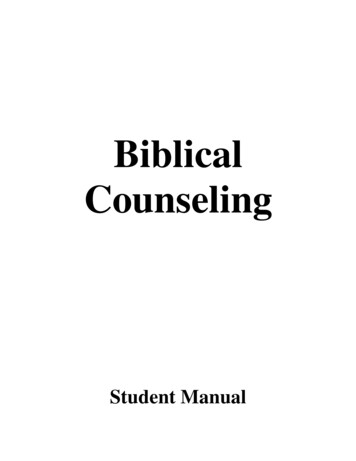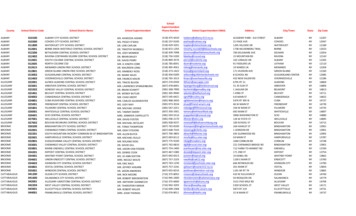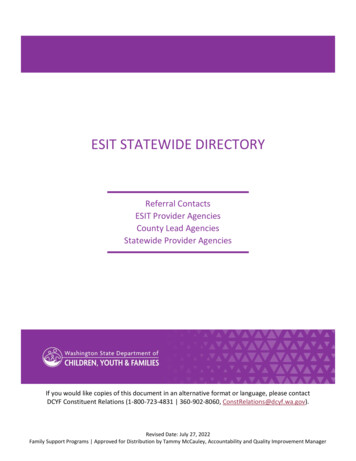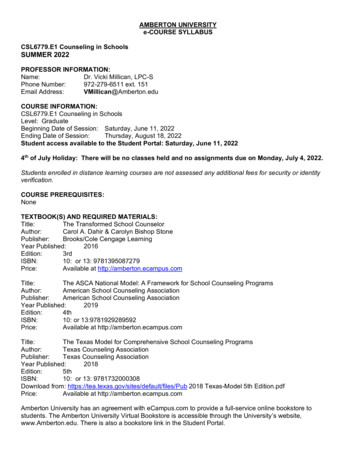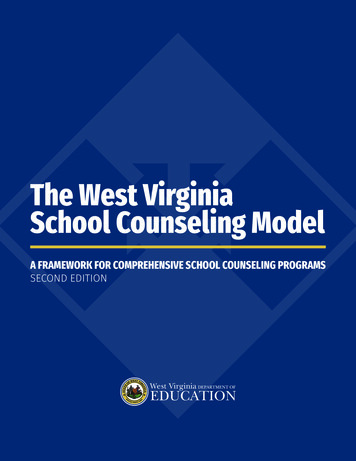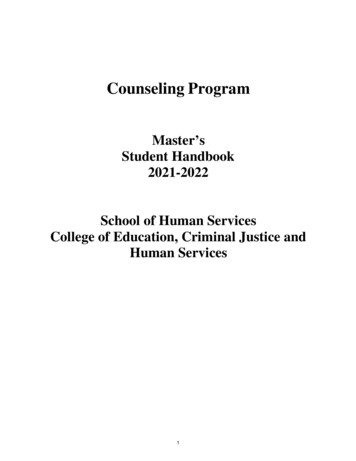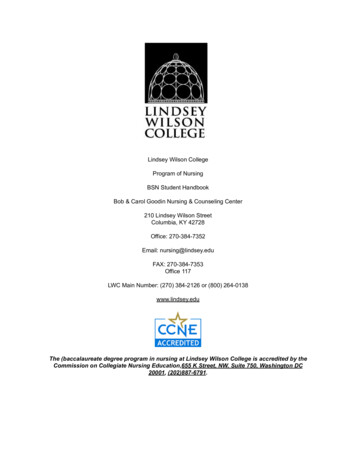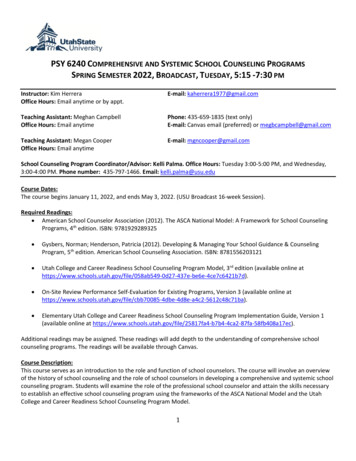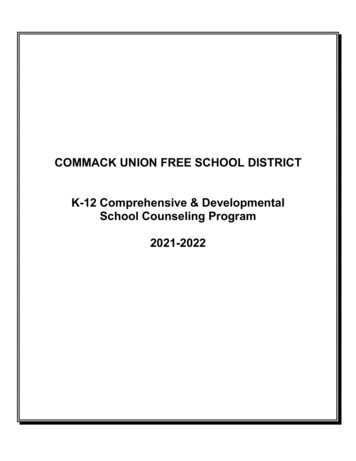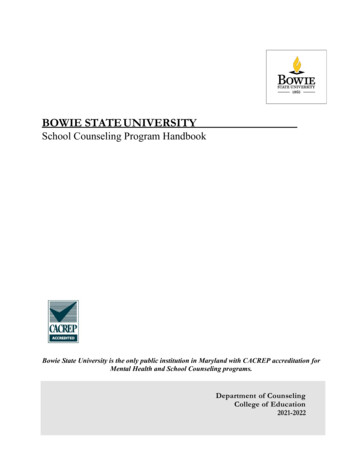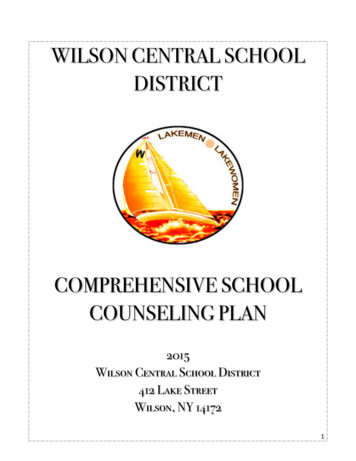
Transcription
WILSON CENTRAL SCHOOLDISTRICTCOMPREHENSIVE SCHOOLCOUNSELING PLAN2015Wilson Central School District412 Lake StreetWilson, NY 141721
Wilson Central School DistrictComprehensive School Counseling PlanAcknowledgementThe Wilson Central School District School Counseling Department would like toacknowledge the counselors, pupil personnel, and support staff for their enthusiasm inthe development of this Comprehensive School Counseling Plan. We thank them fortheir dedication to the Department, students, staff, families, and community of theDistrict. We also greatly thank the administrative team at all levels for their support.StaffMr. Scott Benton, Principal, Wilson Middle SchoolMr. Michael Cancilla, Director of Special Education, Wilson CSDMrs. Alison Faery, School Counselor, Wilson Middle/High SchoolMr. Daniel Johnson, Principal, Wilson High SchoolMrs. Sarah Lombardo, School Counselor, Wilson Middle/High SchoolMs. Kim MacDonald, School Psychologist, Wilson CSDMs. Denise Phillips, School Counselor, Wilson Middle/High SchoolMr. Jeffrey Roth, Assistant Principal/Athletic Director, Wilson High SchoolMs. Marcia Smith, School Psychologist, Wilson CSDMs. Jessica Bakkila, School Counselor (long term substitute for Mrs. Sarah Lombardoin the 2014-2015 school year and contributor to this counseling plan)2
Wilson Central School DistrictComprehensive School Counseling PlanTable of ContentsAcknowledgement.2Staff.2Introduction .4Part 100 of the Commissioner’s Regulations.5What is a School Counseling Program?.7The Role of the School Counselor.8Certification Requirements.9Elements of a Comprehensive l Standards.13Delivery System.20Middle School Plan.24High School Plan.33Management System.45Introduction.46Use of School Counselor’s Time.47Non-Counseling Professional Responsibilities.48Accountability System.49Introduction.50MEASURE.50Results Reports.51Counselor Standards.52Performance Appraisal.56Program Audit.61Appendix.68Glossary.69References.743
Wilson Central School DistrictComprehensive School Counseling PlanIntroductionProfessional school counselors have a vital role in refining student achievement andserve as advocates for both students and systems. Through a comprehensive schoolcounseling program of developmental, preventive, remedial and responsive services,professional school counselors address academic, personal, and career development ofstudents.School counselors focus on the goal of improving student achievement throughleadership, collaboration, data analysis, and advocacy in order to provide necessarysupport to students and create the changes that are essential for the system.The ultimate goal of the professional school counselors at Wilson Central SchoolDistrict is to meet the needs of all students and work to close the achievement gap.The Comprehensive School Counseling Plan will be data-driven and annually evaluatedand modified accordingly in order to ensure that every student achieves success.School counselors will use this data-driven, standards-based model and follow therecommended practice of tionAdvocacyCollaborationThe Wilson School Counseling Department has examined their current services andpractices so that they are aligned with the American School Counselor Association(ASCA), the ASCA National Model and the standards of the New York State EducationDepartment.4
Wilson Central School DistrictComprehensive School Counseling PlanPart 100 of the Commissioner’s RegulationsSchool Counseling/Guidance Programs1. Public schools. Each school district shall have a guidance program for all students.a. In grades K-6, the program shall be designed in coordination with the teachingstaff to prepare students to participate effectively in their current and futureeducational programs, to help students who exhibit any attendance, academic,behavioral or adjustment problems, to educate students concerning avoidance ofchild sexual abuse, and to encourage parental involvement.b. In grades 7-12, the guidance program shall include the following activities orservices:i.An annual review of each student's educational progress and career plans,with such reviews to be conducted with each student individually or withsmall groups by personnel certified or licensed as school counselors;ii.Instruction at each grade level to help students learn about various careersand about career planning skills conducted by personnel certified orlicensed as school counselors, or by classroom teachers in cooperationwith school counselors;iii.Other advisory and individual or group counseling assistance to enablestudents to benefit from the curriculum, to help students develop andimplement postsecondary education and career plans, to help students whoexhibit any attendance, academic, behavioral or adjustment problems andto encourage parental involvement, provided that advisory assistance shallbe provided by teachers or counselors, or by certified teaching assistantsunder the supervision of counselors or teachers, and that such individual orgroup counseling assistance shall be provided by certified or licensed schoolcounselors or by certified or licensed school psychologists or certified orlicensed school social workers in cooperation with school counselors; andthe services of personnel certified or licensed as school counselors.5
c. Each school district shall develop a district plan, which sets forth the manner inwhich the district shall comply with the requirements of this subdivision. The CitySchool District of the City of New York shall submit a separate plan for eachcommunity school district, for the High School Division and for the SpecialEducation Division. Such plan shall be filed in the district offices and shall beavailable for review by any individual. The plan shall present program objectives,which describe expectations of what students will learn from the program;activities to accomplish the objectives; specification of staff members and otherresources assigned to accomplish the objectives; and provisions for the annualassessment of program results. The plan shall be reviewed annually by the schooldistricts, and revisions shall be made as necessary.Office of Elementary, Middle, Secondary, and Continuing Education/Part 11/100.2a./2002/6
Wilson Central School DistrictComprehensive School Counseling PlanWhat is a School Counseling Program?A school counseling program reaches EVERY student and focuses on the knowledge,skills, and attitudes needed for an individual’s successful academic achievement, careerdevelopment, and personal growth. A professional school counselor’s time is spentmaximizing the benefits of a program that serves ALL students.The program is preventive in design and school counselors create programs andservices to meet the needs of all students at the appropriate developmental stages. Aschool counseling program:oooooooooReaches every studentIs comprehensive in scopeIs preventive in designIs developmental in natureIs implemented by a credentialed school counselorIs conducted in collaboration with stakeholdersMonitors student progressUses data to drive program decisionsIs an integral part od the educational program for student successAdapted from The ASCA National Model: A Framework for School Counseling Programs7
Wilson Central School DistrictComprehensive School Counseling PlanThe Role of the School CounselorProfessional school counselors serve a vital role in maximizing student success.Through leadership, collaboration and advocacy, they strive to promote equity andaccess to rigorous educations experiences for all students. According to the AmericanSchool Counseling Association (ASCA), professional school counselors support a safelearning environment and work to safeguard the human rights of all members of theschool community.School counselors address the needs of all students through culturally relevantprevention and intervention programs that are a part of a comprehensive schoolcounseling program.The school counselor is responsible for the following:o Provide individual and group counseling services to meet the developmental,preventive and remedial needs of studentso Coordinates all counseling services for students and assists with the coordinationand implementation of students services at the schoolo Plays a leadership role within the school counseling program and developsactivities to implement and evaluate the program. Also plays a leadership role ata much larger scale by engaging in systems-wide change to provide academic andbehavioral supports for the success of all studentso Consults with students, parents, teachers and other school and communitypersonnel to assist in meeting the needs of studentso Work toward ensuring that every student will have access to a quality andequitable education using their leadership, advocacy, teaming and collaboration,and date-driven decision-making skills.The above is merely a list of examples of a school counselor’s responsibilities. There ismuch more involved with this position that is not listed.8
Wilson Central School DistrictComprehensive School Counseling PlanNew York State Certification RequirementsFor Professional School CounselorsThe strategic goal of the Board of Regents is to provide New York State educationalsystems with qualified, certified and well trained professionals to serve all students.Professional school counselors in New York State must meet the following criteria:Provisional Certification:1) A Master’s Degree from a regionally accredited institution of higher education2) Graduate study in School Counseling: 30 creditsa. School counseling courses are specifically for individuals preparing for acareer as a school counselor3) College Internship/Supervised Practice: The college-supervised internship must bea part of an approved school counseling program. The internship/practice isgenerally the culminating experience of a program leading to a state certificate inschool counseling4) Child Abuse Identification Workshop (mandated reporter training)5) School Violence Prevention Workshop (SAVE Certification)6) Dignity for all Students Act Certification7) Fingerprinting Clearance8) United States CitizenshipPermanent Certification:1) Satisfaction of the above requirements2) Additional graduate work: 30 additional credits in school counseling3) Experience: 2 years in a pupil personnel service position in a public or approvedindependent elementary and/or secondary schoolAdapted from the NYS Comprehensive Model for 7-12 School Counseling Program9
Wilson Central School DistrictComprehensive School Counseling PlanElements of a Comprehensive School Counseling PlanIn 2003, the American School Counselor Association (ASCA) published, “The ASCANational Model: A Framework for School Counseling Programs.” This work outlinesthe components of a comprehensive school counseling program. This working modelhas been extensively researched and successfully implemented in schools all over thecountry. There are four components of the model, each of which are described below.FoundationThe Foundation is the “what” of the school counseling plan. This includes what everystudent will be able to know and do as well as what every student will receive as aresult of the school counseling plan.ManagementThe Management System addresses multiple facets of the school counseling plan. Thisincludes the “when” of the plan, or tools that counselors use. These tools may includean action plan and calendar. The Management System also addresses the “how” of theplan, which is the counselors’ use of data. Lastly, it addresses “who” will implement theplan (the counselors) and “on what authority” (management agreement and advisorycouncil).Delivery SystemThe Delivery System addresses “how” the program will be implemented. It defines theimplementation process and components of the model, including the curriculum,individual student planning, responsive services and system support.AccountabilityThis answers the question, “How are students different as a result of the program?” Theanswer is derived through the use of data by measuring the plan’s progress toward andimpact on academic achievement, graduation rates, post-secondary options, schoolclimate, attendance, and more.Adapted from the ASCA National Model for School Counseling Programs10
Wilson Central School DistrictComprehensive School Counseling PlanFoundationMissionPhilosophyNational Standards11
Wilson Central School DistrictComprehensive School Counseling PlanMission StatementThe mission of the Wilson School Counseling Department is to provide support tomaximize student potential and academic achievement for all students. Our purpose isto foster academic, personal/social, and career development. It is our belief that this willlead to school success. We are committed to helping students attain personal goals,independence, self-understanding, and acceptance of others. Our expectation is thatstudents will leave school with the abilities to take responsibility for themselves and torealize the value of contribution to the community.Philosophy StatementThe counselors at Wilson Central School District believe:ooooAll students have intrinsic valueOur primary role is to be an advocate for every studentAll students have the ability to learn in a developmentally appropriate mannerWe should celebrate and draw upon the diversity among our studentsAnd that the Wilson School Counseling Program should:o Be based on the goals and developmental student competencies outlined by theAmerican School Counselor Association, the New York Department ofEducation, and the Wilson Central School Districto Be proactive and data driveno Draw upon the knowledge of and collaboration with family, school, andcommunity stakeholderso Be willing to seek continuous improvement through self-assessmento Utilize a team approach for planning and management purposeso Embrace technology and enhance program delivery12
Wilson Central School DistrictComprehensive School Counseling PlanNational StandardsThe ASCA National Standards seeks to ensure that all aspects of school counseling areconsidered in order for students to meet their academic, personal and career needs.The standards provides an opportunity to better define the role of the school counselorand establish similar goals, expectations, support systems and experiences for allstudents across the entire country.At the local level, the standards provide an opportunity for all stakeholders to engage inconversations about expectations for students’ academic success and the role ofcounseling programs in enhancing student learning.In accordance with the ASCA National Standards, the Wilson School CounselingProgram facilitates student development in three domains:o Academic developmento Career Developmento Personal/Social DevelopmentEach area includes desired student learning competencies and promote behavior thatenhances learning for all students. The competencies are specific knowledge, skills andattitudes that students should obtain in the standard areas.Adapted from the American School Counselor Association National Model13
Wilson Central School DistrictComprehensive School Counseling PlanASCA NATIONAL STANDARDSAcademic DevelopmentStandard A: Students will acquire the attitudes, knowledge and skills thatcontribute to effective learning in school and across the life span.A:A1 Improve Academic Self-conceptA:A1.1 Articulate feelings of competence and confidence as learnersA:A1.2 Display a positive interest in learningA:A1.3 Take pride in work and achievementA:A1.4 Accept mistakes as essential to the learning processA:A1.5 Identify attitudes and behaviors that lead to successful learningA:A2 Acquire Skills for Improving LearningA:A2.1 Apply time-management and task-management skillsA:A2.2 Demonstrate how effort and persistence positively affect learningA:A2.3 Use communications skills to know when and how to ask for help whenneededA:A2.4 Apply knowledge and learning styles to positively influence schoolperformanceA:A3 Achieve School SuccessA:A3.1 Take responsibility for their actionsA:A3.2 Demonstrate the ability to work independently, as well as the ability towork cooperatively with other studentsA:A3.3 Develop a broad range of interests and abilitiesA:A3.4 Demonstrate dependability, productivity and initiativeA:A3.5 Share knowledge14
Standard B: Students will complete school with the academic preparationessential to choose from a wide range of substantial post-secondary options,including college.A:B1 Improve LearningA:B1.1 Demonstrate the motivation to achieve individual potentialA:B1.2 Learn and apply critical-thinking skillsA:B1.3 Apply the study skills necessary for academic success at each levelA:B1.4 Seek information and support from faculty, staff, family and peersA:B1.5 Organize and apply academic information from a variety of sourcesA:B1.6 Use knowledge of learning styles to positively influence schoolperformanceA:B1.7 Become a self-directed and independent learnerA:B2 Plan to Achieve GoalsA:B2.1 Establish challenging academic goals in elementary, middle/jr. high and highschoolA:B2.2 Use assessment results in educational planningA:B2.3 Develop and implement annual plan of study to maximize academic abilityand achievementA:B2.4 Apply knowledge of aptitudes and interests to goal settingA:B2.5 Use problem-solving and decision-making skills to assess progress towardeducational goalsA:B2.6 Understand the relationship between classroom performance and successin schoolA:B2.7 Identify post-secondary options consistent with interests,achievement, aptitude and abilitiesSTANDARD C: Students will understand the relationship of academicsto the world of work and to life at home and in the community.A:C1 Relate School to Life ExperiencesA:C1.1 Demonstrate the ability to balance school, studies, extracurricularactivities, leisure time and family lifeA:C1.2 Seek co-curricular and community experiences to enhance the schoolexperienceA:C1.3 Understand the relationship between learning and workA:C1.4 Demonstrate an understanding of the value of lifelong learning as essentialto seeking, obtaining and maintaining life goals15
A:C1.5 Understand that school success is the preparation to make the transitionfrom student to community memberA:C1.6 Understand how school success and academic achievement enhancefuture career and vocational opportunitiesCareer DevelopmentStandard A: Students will acquire the skills to investigate the worldof work in relation to knowledge of self and to make informedcareer decisions.C:A1 Develop Career AwarenessC:A1.1 Develop skills to locate, evaluate and interpret career informationC:A1.2 Learn about the variety of traditional and nontraditional occupationsC:A1.3. Develop an awareness of personal abilities, skills, interests andmotivationsC:A1.4 Learn how to interact and work cooperatively in teamsC:A1.5 Learn to make decisionsC:A1.6 Learn how to set goalsC:A1.7 Understand the importance of planningC:A1.8 Pursue and develop competency in areas of interestC:A1.9 Develop hobbies and vocational interestsC:A1.10 Balance between work and leisure timeC:A2 Develop Employment ReadinessC:A2.1 Acquire employability skills such as working on a team, problem solvingand organizational skillsC:A2.2 Apply job readiness skills to seek employment opportunitiesC:A2.3 Demonstrate knowledge about the changing workplaceC:A2.4 Learn about the rights and responsibilities of employers and employeesC:A2.5 Learn to respect individual uniqueness in the workplaceC:A2.6 Learn how to write a résuméC:A2.7 Develop a positive attitude toward work and learningC:A2.8 Understand the importance of responsibility, dependability, punctuality,integrity and effort in the workplaceC:A2.9 Utilize time- and task-management skillsStandard B: Students will employ strategies to achieve future career goals withsuccess and satisfaction.16
C:B1 Acquire Career InformationC:B1.1 Apply decision-making skills to career planning, course selection andcareer transitionC:B1.2 Identify personal skills, interests and abilities and relate them to currentcareer choiceC:B1.3 Demonstrate knowledge of the career-planning processC:B1.4 Know the various ways in which occupations can be classifiedC:B1.5 Use research and information resources to obtain career informationC:B1.6 Learn to use the Internet to access career-planning informationC:B1.7 Describe traditional and nontraditional career choices and how they relateto career choiceC:B1.8 Understand how changing economic and societal needs influenceemployment trends and future trainingC:B2 Identify Career GoalsC:B2.1 Demonstrate awareness of the education and training needed to achievecareer goalsC:B2.2 Assess and modify their educational plan to support careerC:B2.3 Use employability and job readiness skills in internship, mentoring,shadowing and/or other work experienceC:B2.4 Select course work that is related to career interestsC:B2.5 Maintain a career-planning portfolioStandard C: Students will understand the relationship between personalqualities, education, training and the world of work.C:C1 Acquire Knowledge to Achieve Career GoalsC:C1.1 Understand the relationship between educational achievement and careersuccessC:C1.2 Explain how work can help to achieve personal success and satisfactionC:C1.3 Identify personal preferences and interests influencing career choice andsuccessC:C1.4 Understand that the changing workplace requires lifelong learning andacquiring new skillsC:C1.5 Describe the effect of work on lifestyleC:C1.6 Understand the importance of equity and access in career choiceC:C1.7 Understand that work is an important and satisfying means of personalexpression17
C:C2 Apply Skills to Achieve Career GoalsC:C2.1 Demonstrate how interests, abilities and achievement relate to achievingpersonal, social, educational and career goalsC:C2.2 Learn how to use conflict management skills with peers and adultsC:C2.3 Learn to work cooperatively with others as a team memberC:C2.4 Apply academic and employment readiness skills in work-based learningsituations such as internships, shadowing and/or mentoring experiencesPersonal/Social DevelopmentStandard A: Students will acquire the knowledge, attitudes and interpersonal skillsto help them understand and respect self and others.PS:A1 Acquire Self-knowledgePS:A1.1 Develop positive attitudes toward self as a unique and worthy personPS:A1.2 Identify values, attitudes and beliefsPS:A1.3 Learn the goal-setting processPS:A1.4 Understand change is a part of growthPS:A1.5 Identify and express feelingsPS:A1.6 Distinguish between appropriate and inappropriate behaviorPS:A1.7 Recognize personal boundaries, rights and privacy needsPS:A1.8 Understand the need for self-control and how to practice itPS:A1.9 Demonstrate cooperative behavior in groupsPS:A1.10 Identify personal strengths and assetsPS:A1.11 Identify and discuss changing personal and social rolesPS:A1.12 Identify and recognize changing family rolesPS:A2 Acquire Interpersonal SkillsPS:A2.1 Recognize that everyone has rights and responsibilitiesPS:A2.2 Respect alternative points of viewPS:A2.3 Recognize, accept, respect and appreciate individual differencesPS:A2.4 Recognize, accept and appreciate ethnic and cultural diversityPS:A2.5 Recognize and respect differences in various family configurationsPS:A2.6 Use effective communications skillsPS:A2.7 Know that communication involves speaking, listening and nonverbalbehaviorPS:A2.8 Learn how to make and keep friendsStandard B: Students will make decisions, set goals and take necessary action toachieve goals.18
PS:B1 Self-knowledge ApplicationPS:B1.1 Use a decision-making and problem-solving modelPS:B1.2 Understand consequences of decisions and choicesPS:B1.3 Identify alternative solutions to a problemPS:B1.4 Develop effective coping skills for dealing with problemsPS:B1.5 Demonstrate when, where and how to seek help for solving problemsand making decisionsPS:B1.6 Know how to apply conflict resolution skillsPS:B1.7 Demonstrate a respect and appreciation for individual and culturaldifferencesPS:B1.8 Know when peer pressure is influencing a decisionPS:B1.9 Identify long- and short-term goalsPS:B1.10 Identify alternative ways of achieving goalsPS:B1.11 Use persistence and perseverance in acquiring knowledge and skillsPS:B1.12 Develop an action plan to set and achieve realistic goalsStandard C: Students will understand safety and survival skills.PS:C1 Acquire Personal Safety SkillsPS:C1.1 Demonstrate knowledge of personal information (i.e., telephone number,home address, emergency contact)PS:C1.2 Learn about the relationship between rules, laws, safety and theprotection of rights of the individualPS:C1.3 Learn about the differences between appropriate and inappropriatephysical contactPS:C1.4 Demonstrate the ability to set boundaries, rights and personal privacyPS:C1.5 Differentiate between situations requiring peer support and situationsrequiring adult professional helpPS:C1.6 Identify resource people in the school and community, and know how toseek their helpPS:C1.7 Apply effective problem-solving and decision-making skills to make safeand healthy choicesPS:C1.8 Learn about the emotional and physical dangers of substance use andabusePS:C1.9 Learn how to cope with peer pressurePS:C1.10 Learn techniques for managing stress and conflictPS:C1.11 Learn coping skills for managing life eventsAdapted from the American School Counseling Association Standards19
Wilson Central School DistrictComprehensive School Counseling PlanDelivery SystemCounseling CurriculumIndividual Student PlanningResponsive ServicesSystem Support20
Wilson Central School DistrictComprehensive School Counseling PlanDelivery SystemCounseling CurriculumAs per the ASCA National Standards, the school counseling curriculum is,“Comprehensive ins cope, preventative and proactive, developmental in design,coordinated by school counselors and delivered by school counselors and othereducators.” The activities and lessons are delivered to all students to promote skills,attitudes and knowledge in the three content domains: academic development, careerdevelopment, and personal/social development. It is the responsibility of the schoolcounselors to plan, design, implement and evaluate the curriculum.The curriculum is delivered through:o Classroom instructiono Group activitieso Parent workshops and instructiono Interdisciplinary curriculum developmentIndividual Student PlanningAligned with the ASCA National Standards, individual student planning entails schoolcounselors, “coordinating ongoing sys
Comprehensive School Counseling Plan Elements of a Comprehensive School Counseling Plan In 2003, the American School Counselor Association (ASCA) published, "The ASCA National Model: A Framework for School Counseling Programs." This work outlines the components of a comprehensive school counseling program. This working model
